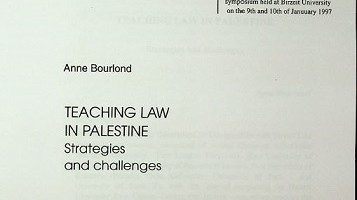Teaching Law in Palestine, Strategies and Challenges
The symposium “Teaching Law in Palestine” was organized jointly by the European Consortium for Cooperation and Birzeit Law Centre on January 1997. The symposium aimed to address the various challenges which face teaching law in the occupied Palestinian Territory (opt) due to the complex political-legal situation. Further, it provided strategies to move forward with the newly established practice of teaching law in the oPT.
The challenges from a general perspective can be summed up in the following three categories:
- Teaching law is a relatively new practice in the oPT, which was not available during the Israeli Occupation prior to the Oslo Accords. The only law teaching experience prior to the Oslo Accords dates back to 1922 and took place at the Palestinian Law Institute which closed at the end of the British Mandate in Palestine.
- Palestinians with foreign law degrees are unaware of the Palestinian legal situation and its complexities.
- On the one hand, there is a plurality of coexisting laws and regulations from the ruling period of the Ottoman Empire, British Empire, Jordanian rule, Egyptian rule and the Israeli Occupation. One the other hand, the existence of two distinct legal traditions, namely, common law and civil law.
The symposium was composed of two sessions; the first part was concerning the analysis of the various aspects and factors influential in the law drafting process. The second part involved a round table discussion to outline the strategies needed to tackle the abovementioned challenges.
PART I – Law Creating Processes
Intertemporal and transitory law; the first is derived from involves multi-instrumental methods of law creation and is derived from the Vienna Convention on the Law of Treaties. The latter is purely a matter of legislation in a local sphere. In this symposium, considering the Palestinian-Israeli conflict, the main issue at hand was the role and creative character of the legal interpretation of the abovementioned sources of law.
Considering the lack of a clear option for the adoption of a single legal system, addressing conflicts of law in a single country whose legal system is composed of various coexisting legal systems is of great importance. The Belgian case was discussed in depth to shed light on a previous example of similar context in terms of coexisting various legal systems, and how it successfully progressed.
PART II – Which Strategies for Teaching Law in Palestine?
Each university participating in the symposium (Al-Najah University, Al-Quds University and Birzeit University) adopted a different approach towards teaching. Whilst Al-Quds University went into a direct full BA programme in Law, Al-Najah University relied on courses from different faculties that were previously adopted. Birzeit Law Centre, however, started with a Masters programme.
The round table discussion did not only involve local universities, it also involved a considerable amount of international universities. The solutions and strategies provided by them through the discussions were:
- The creation of legal libraries.
- Alternative teaching methods that would rather enhance critical thinking
- Development of legal research.
- Development of legal publication based on the research to help the legislative activity.
| معلومات عن المنشور | |
|---|---|
|
اللغة |
الانجليزية |
|
عدد الصفحات |
33 |
|
سنة الاصدار |
1197 |
|
التصنيف |
دراسات |
|
تحميل الدراسة |
|

